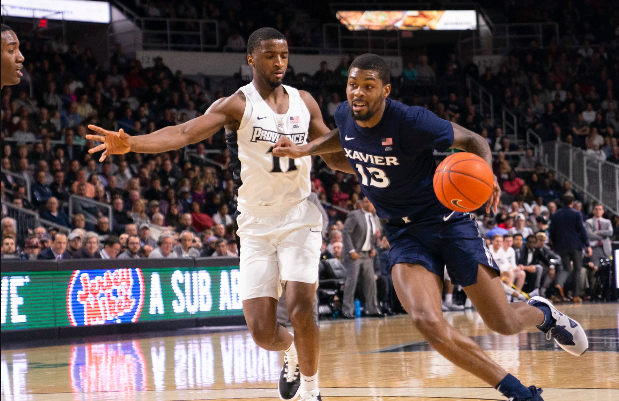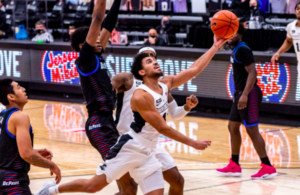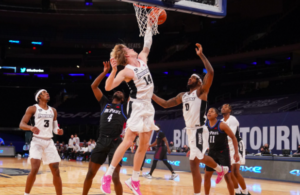- Friarbasketball.com has Moved to Substack!
- Season in Review: Jared Bynum
- Season in Review: Noah Horchler
- Digging in on Al Durham
- The Friar Podcast is a Must Listen
- PC vs. Xavier in 5 Minutes
- Defense is Failing Providence This Season
- UConn/Providence Video Preview with Kevin McNamara
- Jeff Battle and David Duke DePaul Presser
- Noah Horchler Emerging for the Friars
What Alpha Diallo’s Departure Means Providence
- Updated: June 9, 2020

For much of his senior season at Providence, Alpha Diallo had been a lightning rod. As the Friars struggled for a prolonged stretch from the beginning of the season, fingers were pointed in a number of directions. Diallo was on the opposite end as much as anyone in a Friar uniform, save perhaps Luwane Pipkins.
By season’s end, Diallo was playing at the All Big East level expected of him, highlighted by a 35 point explosion against #10 Seton Hall and a monster night in March versus Xavier (25 points on 9-14 shooting). Both were huge wins that would have have been essential to PC’s NCAA Tournament hopes had the tournament not been cancelled.
Diallo’s numbers dipped during his senior season:
- Scoring 16.0 points per game as a junior to 14.1 as a senior
- Rebounding: 8.1 to 7.8
- Assists: 3.1 to 2.8
- Shooting Percentages: .420 from the field, .674 from the line, .333 from 3 as a junior, to .414 from the field, .632 from the line, .313 from 3
While his departure means opportunity for the next wave of Friars on the offensive end, the stats show the bigger void to fill will come on the defensive side.
Let’s take a look inside the numbers.
Despite Diallo not being an overly-efficient offensive player, Providence leaned on him heavily on offense. Over the past two seasons he averaged over 17 possessions per game (a possession = a shot attempt, free throw attempt, or turnover). Even as a sophomore, Diallo was second on PC in possessions, narrowly trailing Rodney Bullock for tops on the team (14.9 vs. 14.3). To put that in perspective, Kris Dunn averaged 18 possessions per game in his two full seasons at PC, while the only two players to crack 20 under Cooley were Ben Bentil in 2016 (20.2) and Bryce Cotton in 2014 (21.4).
Diallo’s possessions per game ranked him seventh in the Big East last year, and second for all non-guards. Xavier forward Naji Marshall was third in the league at 19.2 possessions per game. Here are the Big East rankings for possessions per game last year:
- Markus Howard, Marquette: 26.1 (which is insane)
- Myles Powell, Seton Hall: 22.6
- Naji Marshall, Xavier: 19.2
- Charlie Moore, DePaul: 19.2
- Kamar Baldwin, Butler: 17.8
- Mac McClung, Georgetown: 17.2
- Alpha Diallo, Providence: 17.2
- LJ Figeuroa, St. John’s: 16.2
Diallo’s turnover percentage was third among this group, according to Synergy Sports. His 16.9% turnover percentage (turnovers/total possessions), trailed just Moore (19.0) and Marshall (17.4). No one else in the top eight finished with a turnover percentage above 13%. Diallo scored a point on 38.7% of his possessions last year — good for sixth out of the players listed above.
This isn’t to say Diallo was a bad offensive option. He was particularly effective scoring in the post (86th percentile nationally), but in his higher usage categories the numbers are not as strong in halfcourt sets: 30th percentile in spot up situations and 21st in put backs.
Theoretically, Diallo’s departure should pave the way for Nate Watson and AJ Reeves to step into bigger roles in the offense, and for David Duke to become the highest usage player on the team. Last season Duke averaged 13.3 possessions per game, Watson 9.7, and Reeves 8.8. Not only does Diallo depart, but Pipkins (12) and Maliek White (10.5) graduate with him.
(An interesting side note, last season was the first since 2013-14 in which Providence had four players average over 10 possessions per game).
Between Duke, Reeves, Watson, the progression of sophomore Greg Gantt, and eligible transfers Jared Bynum and Noah Horchler, Providence has plenty of options to step in and grab the touches Diallo left behind.
The defensive end is another question entirely. Diallo was elite defensively as a senior.
Diallo’s defensive metrics are great across the board. His .617 points per possession against were best in the Big East for players getting over 15 minutes a game. It was second overall behind Creighton’s Shereef Mitchell, a 13 minute per game contributor.
Diallo’s .617 points per possession against ranked him in the 95th percentile of any player in the country.
Synergy had opponents being guarded by Diallo shooting 29.5% from the field last year and turning the ball over on 18.3% possessions against him. Opponents scored (field goal or free throw) on 27.8% of their possessions versus Diallo.
Creighton’s Ty-Shon Alexander was considered by many to be the best defender in the league last year outside of Seton Hall shot blocker Ro Gill. Diallo narrowly rated higher in points per possession against (.617 to .622) and field goal percentage against (29.5 to 30.3), while Alexander edged him in scoring percentage against (27.5 to 27.8).
Diallo ranked fourth in the league in both field goal percentage against and scoring percentage against.
Not only are his overall numbers great, Diallo defended well in a variety of different play types. He ranked in the 89th percentile nationally in spot up situations, 81st in hand offs, 94th in isolation, and 95th in post ups. Synergy ranked him in the 97th percentile in the country in defending jump shots a year ago.
As a team, PC finished in the 80th percentile against spot up opportunities, 80th in hand offs, 41st in isolation, and 66th in post up defense.
Synergy ranked Diallo in the 95th percentile in points per possession against, Duke finished in the 83rd percentile, and Kalif Young was third on the team at 54th.
The positive sign for the Friars is that the top of the defensive ratings are often littered with upperclassmen. Between more deeply understanding defensive concepts and physical development, strides continue through all four years, unsurprisingly.
Duke could very well enter that elite group next year (he’s teetering now, statistically), while Gantt came to PC with the reputation of a player who can develop into an elite defender.
So, while Diallo’s departure stands as an opportunity for the returnees on the offensive end, the coaching staff will be tasked with maintaining a very good defense going forward, despite losing an outstanding individual defender.
Providence finished with a 92.8 defensive rating last year — a best in the Ed Cooley era, according to Ken Pomeroy. It also ranked 27th in the nation. Cooley’s teams have defended at a level that has kept them in, or around, the top 40 in the nation both during and prior to Diallo’s arrival, but the loss of his versatility and effectiveness on that end will surely be felt.




You must be logged in to post a comment Login